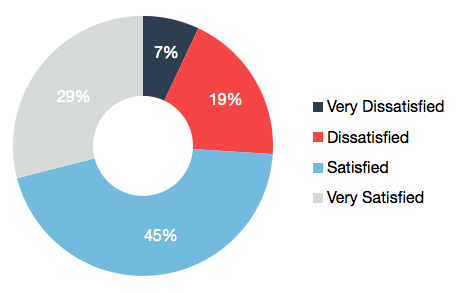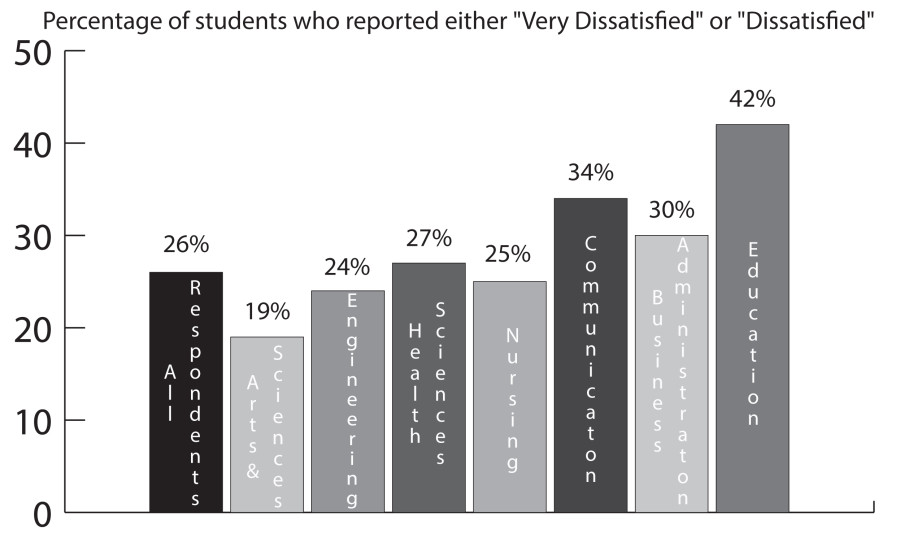
With bright red letters or bold and imposing text, colleges across campus have been sending e-mails to students making sure they know what time of the year it is: advising week.
Brittany Hasseldeck, a senior in the College of Education, said advising adds more stress to her already busy schedule. In the past, she has had trouble with faculty advisers who did not have an adequate knowledge of the sequences in which some courses must be taken or necessary prerequisites. This makes it difficult to select classes when working with a tight schedule, and can lead to complications.
“Since the advisers are often not informed, we can be misinformed as well,” Hasseldeck said in an e-mail. “I kind of feel like college is stressful enough and that advising should be simple, not one more added stress.”
Faculty and students alike say they have found the advising system to be complicated and confusing. As students fear they cannot trust their advisers’ recommendations, and advisers worry they aren’t adequately prepared to navigate course requirements, there is a mutual anxiety within the system
Navigating the system
Unlike some other universities, which have a staff of professional advisers whose sole duty is to consult with students on their course schedules, Marquette relies almost entirely on faculty advisers who also have other responsibilities.
The primary advantage of using faculty members as advisers is that students have the opportunity to work with a faculty member in the student’s field of interest. Students then have a resource for advice specifically related to areas like graduate school, internships and careers.
In Marquette’s Colleges of Communication and Engineering, freshmen with a declared major are immediately paired with a faculty adviser. A specific faculty member advises all undeclared freshmen. In other undergraduate colleges, freshmen are initially assigned to a professional adviser or designated freshman adviser and transitioned to a faculty adviser after they declare a major.
Freshmen in the College of Arts & Sciences enter as undeclared majors and most are assigned to one of the college’s professional advisers, based in the college’s advising center. Arts & Sciences is the only college with a formal advising center.
[youtube]7gX2FSF27m8[/youtube]
The primary job of these pre-major advisers is to help students with core requirements and the transition from high school to college life, said Mary Minson, senior assistant dean of advising in Arts & Sciences.
“A lot of what we do is helping students find who they are, so they can then go to a faculty member and that faculty can be a mentor,” Minson said. “I’m very good at helping students transition to Marquette … but by the time that student wants to be a political science major, it’s wonderful for them to have someone from that background.”
Jolyn Bemis, a junior in Arts & Sciences, said the professional advisers in Arts & Sciences are knowledgeable and helpful, adding that her own adviser has helped her take the right courses to fulfill her requirements.
“(My adviser) is really great about finding things that will work in my schedule,” Bemis said. “If I e-mail her, she will respond right away.”
But some students have an adviser for each of their majors as well as for certain academic programs like the honors program or the Freshman Frontier Program. Some individual majors, such as biochemistry, mandate that students have two advisers within the program.
This all means a student could end up having four advisers or more, each offering advice based on their specific area.
Elise Pellman, a sophomore in Arts & Sciences, is currently an undeclared major but on a biochemistry track with an intent to double major in philosophy.
She is also part of the honors program.
Pellman said she has avoided declaring her majors because she would then have four different advisers — two for biochemistry, one for philosophy and one for the honors program.
“I don’t want to have all those people to talk to and keep up with,” she said.
Currently, she relies on a copy of the undergraduate bulletin — which she says is dog-eared and full of Post-its — and advice from her honors adviser for class scheduling.
“I don’t really have a need for an adviser if I just read through everything carefully,” she said.
A stress on faculty
Students aren’t the only ones who think advising can be complicated — faculty feel the burden, too.
Faculty advisers have many other responsibilities besides advising. They are still expected to teach, conduct research and be involved in other areas of the university.
In the College of Business Administration, all freshmen are assigned to Joseph Terrian, assistant dean of undergraduate programs for the college. They are transferred to a faculty adviser at the beginning of their sophomore year.
“To those faculty that don’t care to do it, or don’t enjoy doing it, or have many other priorities, it becomes a stress,” Terrian said.
The university already puts a lot of pressure on faculty to both teach well and conduct research, said Barrett McCormick, chair of the political science department.
“We’re expected to publish at a level that some professors do at other universities where they have a much lighter teaching load, yet we insist that our faculty are really good teachers as well,” McCormick said.
Advising is not necessarily dreaded by faculty members, but it does add to their workload.
“I don’t think that there’s any particular dismay about advising, but just in general faculty feel like they work pretty hard,” he said.
A professor in the political science department might advise anywhere from five to 40 students, McCormick said.
Professors do their best to be attuned to each of their advisees, but individual attention can become difficult, he said.
“That’s a pretty demanding standard to be thinking every day with every person you run into, ‘What can I do that’s going to be good for this person?’” he said. “I don’t think that’s the kind of ideal where you’re ever going to be completely satisfied.”
Memorizing the bulletin
Faculty often encounter students who enter sessions expecting their academic adviser to tell them exactly what courses to take.
But students should be able to figure that out themselves using various CheckMarq tools like the degree progress report, Terrian said.
“It’s really the student’s responsibility to determine their courses, to know what they need to graduate,” he said.
If students determine the courses they need to take in advance, the advising session can be better used for discussions on career preparation or graduate school, Terrian said.
“Those more quality discussions are going to surface more because I don’t have to waste that time,” he said.
Many faculty members enjoy helping students determine what they will do with their futures, McCormick said.
But helping students figure out what courses they need to fill certain core requirements is a less enjoyable endeavor and is also one some faculty feel unqualified for, he said.
“That requires really special expertise, and in order to do that well you have to know a whole lot,” McCormick said. “You have to kind of memorize the bulletin. I think some faculty feel that they’re just not very good at that.”
In some instances, a faculty member’s lack of expertise in course requirements can complicate students’ planning.
Caitlin Dee, a junior in the College of Education, said she has worked to make sure she knows all her course requirements to avoid potential problems with misinformation from a faculty adviser.
“I have it all put together in a binder of what I need to take and when it needs to happen,” Dee said in an e-mail. “I did this mainly because I heard about all of the problems with advising.”
In one instance, Dee said she had a question about what courses she was exempt from after taking two honors English classes.
Dee said she asked two advisers and one faculty member and received a different answer from each.
Student responsibility
A professional advising staff could mean faculty don’t have to worry about knowing the university’s core and can instead focus on mentoring, McCormick said.
“I think some faculty think that kind of technical advising about university requirements might be better handled by people who are paid to know an awful lot about that,” he said.
An advising center similar to Arts & Sciences would not necessarily work in the College of Business Administration, Terrian said, because faculty with experience in their industries also serve as mentors, an especially important role for business students.
However, Terrian said he would like to be able to reduce the teaching load of a handful of faculty members and designate them as advisers for freshmen and undeclared sophomores so they could specialize in the kind of help those students need.
But such an action may not be possible, and the current system in Business Administration is functional, he said.
Regardless, keeping up with course requirements is more of a responsibility for the students than faculty members, he said.
Faculty can offer feedback and advice about which courses students ought to take but should not be expected to produce a student’s schedule for them, he said.
“It’s very easy to see the graduation checklist (on CheckMarq), so I don’t see that being too significant of a load for our faculty,” Terrian said.



